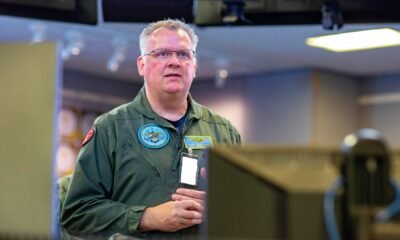Humanitarian Aid
Walter Reed Launches Comprehensive Mental Health Partial Hospitalization Program
Walter Reed National Military Medical Center offers the Partial Hospitalization Program (PHP), a crucial initiative designed to support individuals with behavioral health challenges while allowing them to continue living at home.
The PHP provides a structured treatment setting during the day, allowing participants to return to their homes at night. Navy Lt. (Dr.) Meghan Quinn, a psychiatrist and the PHP chief, explained the program’s goal: enabling patients to maintain daily contact with loved ones, which aids in their recovery.
The program began at Walter Reed Army Medical Center (WRAMC) and moved to Bethesda’s Walter Reed National Military Medical Center following WRAMC’s closure in 2011. Despite reductions during the COVID-19 pandemic, the PHP resumed standard hours last year. It now celebrates a significant milestone—completing one year of comprehensive mental health treatment for active-duty service members, according to Quinn.
Describing the day-to-day operations, Quinn noted the PHP is a full-day program recognized as official duty with command approval. This arrangement benefits patients by facilitating close communication with military commands, enhancing their fitness for duty evaluations.
The program lasts four to five weeks. It begins with morning technician-led groups and includes daily closed group sessions addressing critical topics like coping with suicidal thoughts. Optional wind-down sessions offer a therapeutic close to most days.
With a capacity of up to 40 patients, Quinn emphasized the importance of manageable group sizes to foster active participation. Patients are split into two programs: the Comprehensive Recovery Program (CRP) for general mental health and the Trauma Recovery Program (TRP) for trauma-related issues.
Key staff includes 10 primary therapists, two psychiatrists, and additional support from art therapists and nurse practitioners. Notably, many are former military members or related to service members, bringing extensive experience in military-specific issues.
PHP patients engage in weekly formal art therapy and recreational activities like zoo visits and rock climbing excursions. There is horticulture therapy, and patients benefit from regular interactions with therapy dogs.
Moreover, consistent medication management and individual therapy sessions ensure comprehensive care. Weekly clinic team meetings assess each patient’s progress, providing a holistic understanding of their treatment.
Quinn also highlighted the stigma surrounding mental health care within the military, emphasizing that 97 percent of service members experience no negative career impact from seeking treatment, according to a 2006 study in Military Medicine.
The program incorporates adjunct therapies like Transcranial Magnetic Stimulation (TMS) for severe depression and battlefield acupuncture for pain, insomnia, and depression. Additionally, Alpha Stimulation helps manage chronic pain and insomnia.
A memorandum of understanding with Building 62 at Walter Reed offers accommodation for patients traveling from long distances, addressing a crucial need in the National Capital Region.
Quinn remains committed to adapting PHP based on patient needs and referral trends, recently integrating trauma-specific treatments like eye movement desensitization and reprocessing for post-traumatic stress. She expressed a desire for increased awareness and referrals to the program.
PHP serves a broad spectrum of ranks, providing critical mental health services within the National Capital Region. For more information, contact the PHP front desk at 301-400-2110. In a mental health emergency, call 911, the 988 Suicide and Crisis Lifeline, or visit the nearest emergency room.
Story originally posted on DVIDS: Walter Reed Offers Partial Hospitalization Program for Mental Health Care











